PART THREE
The story of the Modern Nation-State is not just about us (assuming we live in liberal-democratic states)! For much of the twentieth century there were as many Leninist regimes in the world as Liberal Democratic regimes. In this section of our course, I will focus on the glorious rise and shockingly abrupt demise of the Leninist Nation-State, one of the most dramatic sagas of modern times. These regimes didn’t come from nowhere. As we shall see, they were inspired by an alternate path to the modern nation-state that had its roots in a revolutionary movement known as Marxism.
What do I think about Leninism? The Leninist regimes of the past century pursued horrific policies; tens of millions of people died under Leninist rule. This is a fact. I have personally experienced life under communist rule, and I have no romantic views about the subject. Nonetheless, whether we like Leninism or not, our task is to make sense of this significant chunk of human history. In my view, the most interesting question is why these regimes lasted as long as they did. In part, the answer lies in the initial promises of Marxism. It also lies in the fact that Leninist regimes–including those that still bear some features of Leninism, such as China and Cuba–were able to satisfy their populations’ demands for various goods: social welfare, economic transformation, national identity, social stability, and cultural fidelity.
Because Leninism represented the most successful challenge to Liberal Democracy in the modern age, the long life of the Leninist party (communist party) also provides us with insight into contemporary political challenges. Its appeal to peoples around the world helps us to understand the continuing popularity and practices of (noncommunist) authoritarian figures, like Vladimir Putin and Kim Jong-un.
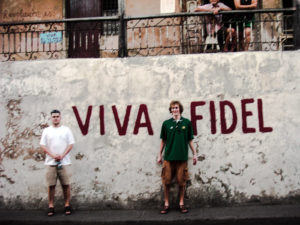
Leninism‘s long life also provides useful clues to understanding the appeal of explicitly anti-liberal movements in liberal democracies today. Why do people fall prey to populist autocrats in the liberal-democratic world? And why would they be willing to sacrifice the liberties and rights they currently enjoy? I am suggesting that the past may be present—and future.
15. Lecture: Wednesday, September 27
Karl Marx’s Communist Manifesto and its significance for the history of world communism.
Today’s Question: Why did many smart, well-educated people (i.e., educated elites and members of the ruling class like you) become Marxists? My argument is that Marxism shared many of the same modern foundations as Liberalism. At the same time, it represented a radical critique of Liberal thought.
Assignment: Read the Manifesto carefully–I suggest, at least three times. It is one of the greatest and most influential publications of all time. Look beyond the details for Marx’s overarching argument. What case is he making against capitalism? Why would it have been so appealing to many 19th and 20th century radicals? As you read the essay, pay close attention to what Marx says about the revolutionary character of the bourgeoisie. And look for those moments when he ridicules liberals and capitalists for betraying their own goals.
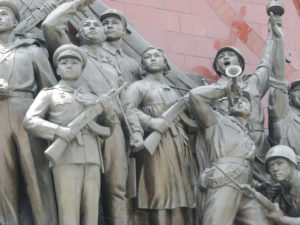
Karl Marx and Friedrich Engels, The Communist Manifesto, only sections, 1, 2, and 4.
Read the following short articles to get a sense for the environment in which Marx’s ideas thrived:
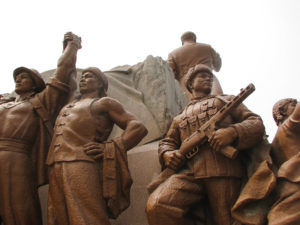
Friedrich Engels, “On the Condition of the Working Class in England” PRINT AND READ
M. Faraday, July 7, 1855, “The Filth of the Thames” TAKE NOTES
To put the movement in a contemporary perspective, read:
John McCain, “Salute to a Communist” READ
How could a middle-of-the-road Republican politician, like John McCain, find anything to admire about a communist? McCain hated communism. In my view, McCain was a true American hero. He thought for himself and epitomized the decency and compassion we should expect from any democratic leader. I have visited the Hoa Lo prison in Hanoi where he was held. If you look toward the bottom of this article, you’ll find Cell 13. I once stood next to that door and looked at the guillotine.
16. Discussion Section: Friday, September 29
Discussion: The Communist Manifesto was once banned across the United States. Now, you can read it and try to figure out what all the fuss was about. (Or was it simply dumb to ban it?) I am strongly opposed to the banning of books—why do Americans on both sides of the political spectrum fear books, like Fahrenheit 451, Catcher in the Rye, Ulysses, Lady Chatterley’s Lover, The Adventures of Huckleberry Finn, and many more? Why should we be afraid of words? Yet, the saga continues.
Interestingly, Marx’s thinking was, in some specific ways, consonant with Liberal ideals. This should not be surprising since he was writing at the same time and, for much of his life, in the same place as Mill and other liberal thinkers. Yet, he came to radically different conclusions about whether Liberalism’s idealistic principles could be realized. How can both of these claims be true? Keep in mind that Marxism, like woolly mammoths and alligators, had to come from somewhere. In fact, it had many of the same historical roots as Liberalism.
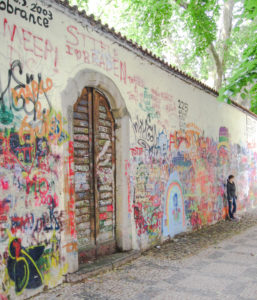
Assignment: How might the essential aspects of Marx’s critique of capitalism appeal to contemporary populist politicians, especially Bernie Sanders and, yes, even Donald Trump? Why would they not appeal to non-populist and more traditional politicians, like Joe Biden and Mitt Romney?
17. Lecture: Monday, October 2
The roots of the Bolshevik revolution: Czarist Russia, disaffected elites, and the unintended consequences of imperial ambition.
Today’s Assumption: Marx predicted that the proletarian revolution would take place in the industrialized world, and especially in Great Britain and Germany. He specifically argued that it would be long delayed in places like Russia or, later, places like China and Cuba. So, why did Marx’s revolution occur where it was not supposed to happen? And why did it not happen where he predicted? Like everything, communism has a history. Unlike the western industrial world, the Bolshevik revolution of October 1917 provided the right context for mass upheaval
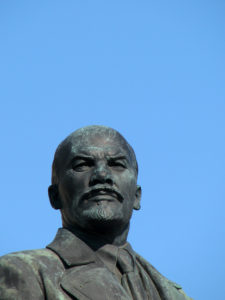
In considering the Bolshevik revolution, I also seek to address the issue of historical and political change. Since people use and overuse the word “revolution” all the time, I want you to think about how we should distinguish between truly “revolutionary” events, on the one hand, and events that are only highly significant, on the other. In my view, with which some observers would disagree, there haven’t been many revolutions in modern history. Indeed, I am not totally convinced that the American Revolution was a “revolution,” at least not socially or economically. Please feel free to disagree with me.
Most likely, some of you have not taken courses on the Bolshevik Revolution. Even if you have, it’s always valuable to learn more. Here is a terrific video that will provide you with some general background about both the Bolshevik Revolution and its antecedents:
“The Russian Revolution,” DocumentaryTube.com (1:33.54) WATCH as much of this film as you can.
18. Lecture: Wednesday, October 4
Vladimir Ilyich Lenin and his successors transformed elementary Marxism into a new political identity: Leninism (originally known as Bolshevism).
Today’s Assumption: Leninism was all about defining the conditions under which Marxist ideals could be realized. Marx could not have imagined how Lenin and his successors would adapt his ideas to backward Russia. Although Lenin was a mediocre philosopher and historian, he was a world-historical revolutionary. He knew instinctively how to apply a western recipe for radical change to a backward country. For this reason, I contend that “Marx was archaeopteryx and Lenin was his bird.” See HERE What do I mean by this analogy.
Assignment: The best way to understand the tragic implications of Leninism in practice is to see how it was implemented at the height of the Soviet revolution of the 1930s under Josef Stalin’s leadership. To this end, I am asking you to read The Man himself.
Two selections from Josef Stalin, Foundations of Leninism. PRINT AND READ Section 4 (“Dictatorship of the Proletariat”) and Section 8 (“The Party”)
As always, get a general sense for Stalin’s argument; don’t worry about the details. You should treat the document as though it is a handbook (like the Boy Scout and Girl Scout handbooks). This is exactly what it was. It was intended to give Bolsheviks a clear and definitive understanding of what they should do and why Marxism was relevant to them.
Revolutionaries typically produce great music, in part because tumultuous times allow them to motivate their followers so easily. The rousing anthem, “The Internationale,” became the hymn for communist and other radical working-class movements throughout the world.
Watch Pete Seeger sing the The Internationale. I sang it to my tour guides when I was in Pyongyang, North Korea and it drove them crazy. How could they prevent me from paying tribute to one of their ideological forebears! Yet the entire time I was in North Korea, I only saw one picture of Marx and and one of Lenin. Alas–but revealingly–they were removed not long thereafter.
If you like, here are some other versions of the International:
The classic Soviet version WATCH
Also, from the engaging movie ‘Reds’ starring Warren Beatty and Diane Keaton: WATCH
Also, Bill Murray’s puppet sings: WATCH
Also, Rage Against the Machine: WATCH
Also, listen to “Occupy Wall Street” protesters sing the Internationale WATCH (I doubt that many understood what the words represented, but the fact that they sang it demonstrates the romantic appeal of revolutionary movements. Again, this is relevant to explaining why even repressive movements can last for as long as they do.
19. Discussion Section: Friday, October 6
Paragraph assignment: “If Marx was an archaeopteryx, would that make Lenin his bird?”
Discussion: You have been assigned to start a political, social, and/or cultural revolution–a real one!–at Notre Dame. Based upon your reading of the the Communist Manifesto and the chapters from Stalin’s Foundations of Leninism, please exuberantly and passionately discuss the following two questions: 1) what advice would Lenin and Stalin give you about fomenting this revolution? and 2) what challenges would you face, both in the beginning and in keeping the revolution going?
to start a political, social, and/or cultural revolution–a real one!–at Notre Dame. Based upon your reading of the the Communist Manifesto and the chapters from Stalin’s Foundations of Leninism, please exuberantly and passionately discuss the following two questions: 1) what advice would Lenin and Stalin give you about fomenting this revolution? and 2) what challenges would you face, both in the beginning and in keeping the revolution going?
20. Lecture: Monday, October 9
The transmogrification of Marxist and Leninist utopia into Stalinist terror.
Today’s Assumption: Stalin’s regime of terror was intrinsically, though not inevitably, rooted in the goals and institutions of Leninism in the Soviet Union. Leninism also precipitated horrific violence in other countries, especially China in the 1950s and 1960s. Alas, in a single course, we don’t have enough time to cover the varied expressions of this degeneration outside of the Soviet Union. However, if you are interested, you can see my account of these experiences in my book, Vanguard of the Revolution. I would be happy to talk with you about any of these experiences, such as in China, Cuba, North Korea, Poland, East Germany, and many more.
The following two background readings are meant to give you an idea of the cult of Josef Stalin and the enormity of the crimes committed under his rule.
“Purges and Hysteria in the Soviet Union”: READ (all six pages)
Ode to Stalin: READ
21. In-Class Film, Wednesday, October 11:
“Journey to Russia”
“Journey to Russia” documents the experiences of members of an American debate team who traveled to the Soviet Union in the early 1980s and were charged with defending the merits of liberalism and capitalism. It is a fantastic depiction of life as people actually lived it in the Soviet Union at this time, long after the atrocities of Stalinism. When I talk about why communism lasted as long as it did, you will see how this film relates directly to the topic. The film’s depiction of people’s attitudes in the Soviet Union in the early 1980s is exactly what I experienced when I lived and travelled in the Soviet bloc during these years.
Take lots of notes, as this film will be the discussion topic on Friday
22. Discussion Section: Friday, October 13
Discussion Topic: The “Real World” of Post-Stalinism in the Soviet 1980s as you see it in “Journey to Russia”
Paragraph assignment: TBA
MID-TERM BREAK
October 14-21
23. No Class: Monday, October 23
I will be in the Czech Republic and Slovakia
24. Lecture: Wednesday, October 25
The Leninist challenge to Liberal Democracy.
Today’s Assumption: Leninism was initially a credible challenge to Liberal Democracy. As you can garner from watching “Journey to Russia,” its appeal was reinforced by a variety of factors. In the 1980s, my family and I had the unusual experience of living in East Germany; I was conducting research. I’ll attempt to give you a sense for a variety of these factors by sharing my experiences in the years before the fall of the Berlin Wall. To live in the Soviet bloc at that time was very different–and, its own way, more “normal”–than under Stalin’s totalitarian regime. I’ll explain how and why.
In the 1980s, all of the experts, including yours truly, were skeptical about the possibility that people living under communism could rise up spontaneously against their leaders. Nonetheless, in the 1970s and 1980s, dissidents like the physicist Andrei Sakharov and the playwright Vaclav Havel, were already providing provocative ideas about why such events might occur.
NOTE: Havel’s essay is not only about life in Czechoslovakia. It is about the difference between “living within a lie” and “living within the truth” in any society, including those in the liberal democratic world, such as the US. The dispute over the meaning of “truth” and its implications for our behavior plays a significant role in the turmoil of western democracy today.
At this stage of our discussion, let’s ask why McAdams and other experts underestimated the power of Havel’s account.
Václav Havel, “Power of the Powerless,” in Open Letters: Selected Writings, 1965-1990, sections I-VI.
The “Power of the Powerless” is challenging reading. Please reserve a significant amount of time for reading this essay. You will need to have finished these chapters for your discussion section on Friday.
To understand the context in which Havel wrote this essay and why it was so difficult to be a dissident under communist rule, read this brief article on the Czechoslovakia’s Charter 77 movement (HERE)
Optional: here is a short article about Havel’s life
25. Discussion Section: Friday, October 27
Topic: Living within a lie under communism . . . and in advanced democracies?
Discuss the first half of “Power of the Powerless.” Why is the greengrocer so important to Havel’s argument? What motivates the greengrocer to act as he does? What prevents the greengrocer from acting differently? Is he simply misinformed? How is the greengrocer similar to the students in “The Journey to Russia”?
Paragraph Assignment:
Havel’s story about the greengrocer is a depiction of everyday life in “post-totalitarian” Leninist regimes. However, one can also read it as a parable about the everyday life of all human beings.
Would it be possible for anyone to live “within the truth” at all times and in every respect? Dare to admit that you aren’t superhuman: Pick a single example in which you would have to admit that you currently “live within a lie.” Why do you live within this lie and why would it be so difficult to abandon it? (Don’t worry: I am not asking you to get too personal. Just choose one illustrative example).
26. Lecture: Monday, October 30
Surprise, surprise: The sudden and total collapse of the Leninist Nation-State.
Today’s Assumption: No one truly predicted this explosive development. For that matter, Leninism was not destined to collapse when it did. How are these claims compatible, and not contradictory?
Gorbachev’s dilemma: If you try to reform a highly hierarchical organization (the communist party) based upon a dogmatic belief system, you run the risk of alienating other elites and opening up your organization to challenges that threaten to diminish its authority. However, if you don’t reform it, that is, open it to greater participation by previously excluded persons and try to make its belief system more flexible and attract it, you risk losing your followers and weakening its authority. What to do?1
Assignment: Reflect upon Mikhail Gorbachev’s role in trying to reform Leninism and then unintentionally precipitating the fall of the Leninist Nation-State. Could he have acted differently? Did he really have a choice?
Here’s some background to Gorbachev’s attempt to reform Leninism. READ
Based upon what you have read and on what we have discussed, could Leninism have been reformed in the way Gorbachev hoped? How compatible were Gorbachev’s two primary reform concepts (below) with the Leninist political identity?
Gorbachev’s concept of Perestroika READ
Gorbachev’s concept of Glasnost READ
Implications: What lessons can we garner from the Leninist experiment about the collapse of dictatorships in general? Is it enough to present people with the facts about a dictatorship’s failings to persuade them that the system doesn’t work? This question of human psychology applies to those of us who live in liberal democracies as well. Why do many intelligent people refuse to accept political facts, even in liberal democracies? What role do certain circumstances play in the denial of facts?
Of course, human beings can be led to believe all kinds of crazy things. Consider the implications of this survey on what Americans think about the solar system: HERE
The fact that citizens believer crazy things allows us to pose an interesting question: If citizenship is about enabling thoughtful people to engage in thoughtful criticism of their government, what should we do with citizens whose thoughts are patently false? Should they have an equal say in political decisions and sophisticated citizens. People like de Tocqueville were conscious of this problem and skeptical that people of all types were capable of making well-informed decisions. However, there is another side to this question: Who gets to decide whether someone has the ability to make informed decisions? If the wrong people are in power, they will happily call their opponents uninformed and use this as a pretext to exclude them from political life.
Finally. and highly relevant to your studies at this Catholic university: The dilemma that Gorbachev faced in trying to reform the system of communist-party rule is not an isolated case. The challenge exists in all hierarchical organizations: how do you reform such centralized organizations while simultaneously maintaining the principle that justifies hierarchical rule. The Catholic Church has been a prime example of this challenge for centuries and remains so today. Read this insightful article and meditate on Pope Francis’s decisions and the nasty responses to them from the American bishops. What path should the leaders of the Catholic Church follow if they want the organization to thrive and survive: READ
27. Lecture: Wednesday, November 1
The fuzzy transition to post-communism in the 1990s and the advance of populist demagoguery in the 2010s.
Another surprise! As if the fall of Leninist regimes between 1989 and 1991 were not a big enough surprise, another surprise came not long thereafter. Almost immediately after these happy developments, most of the the post-communist states of the former Soviet bloc swiftly adopted Liberal Democratic institutions.
And the surprises kept coming. While many experts celebrated the apparent victory of liberal democracy in the European postcommunist states, this transition proved to be more difficult than expected. Today, the populations of many of these states face a sobering question: Will liberal democracy survive in a meaningful sense down the road? The past decades’ developments in Hungary, Poland, and Russia give us cause to worry. However, those in Slovakia, Croatia, the Czech Republic, and even war-torn Ukraine give us cause for hope.
For your amusement, here are some peculiar signs of life after communist dictatorship.
Gorbachev sings LISTEN
Vladimir Putin plays piano and sings WATCH
Assignments:
For your discussion section on Friday, finish reading Václav Havel, “Power of the Powerless,” in Open Letters: Selected Writings, 1965-1990.
What is new and what has changed after the revolutions of 1989-1991?
Jaroslaw Kuisz and Karolina Wigura, Foreign Policy, May 13, 2020, “Why populists understand eastern Europe better than liberals,” READ
Optional: Vladimir Tismaneanu, “The Legacies of 1989: The Moving Ruins” Journal of Democracy, January 2014 See PROJECT MUSE at Hesburgh Library e-Journals READ
The following articles raise an important question for political scientists: Why and under what circumstances are mythological depictions of leaders more important than addressing the facts about such figures?
Why would Stalin still be popular in Russia? Nadia Beard, “Stalin Rises Again” READ
Julia Ioffe, “Why many young Russians see a hero in Putin” READ
Once you have read these articles, reflect upon alternative models for this transition: mass extinction or archaeopteryx. What would the adoption of one or the other image tell you about the fact that the post-communist transitions have been more difficult that experts expected?
YOUR SECOND ESSAY ASSIGNMENT IS HERE.
YOUR ESSAY IS DUE BY FRIDAY, NOVEMBER 10 AT 5:00 pm
28. Discussion Section: Friday, November 3.
Václav Havel, “Power of the Powerless,” in Open Letters: Selected Writings, 1965-1990
Discussion Topic: Conclude your discussion of Havel by asking what makes the green grocer revolt. Is Havel’s analysis persuasive? Or when we are dealing with oppressive dictatorships, is it just wishful thinking to expect that the weak will rise up against the strong?
Compare Havel’s argument with a non-Havelian counterargument. Here’s an example of a (sometimes) Putin critic wh0 would say that it’s pointless to stand up to a dictator.
Anton Troianovski, “She Once Ran Against Putin. Her Advice Now: Resistance Is Futile” READ AND PRINT
Does this argument apply in any way to liberal democracies? When people living in democracies are persuaded by the powerful to “live within a lie,” how easy is it to persuade them to rise up against those seek to manipulate them?
Paragraph Assignment: Identify one example of people “living within a lie” in American politics today and then identify the single most effective approach you would use to persuade them to change their view and “live within the truth.”
